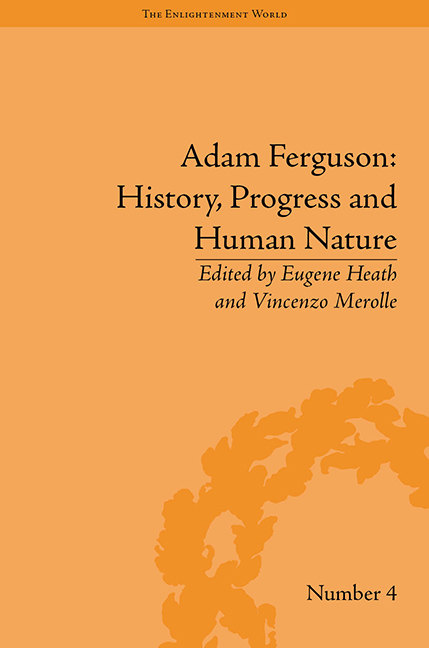Book contents
- Frontmatter
- CONTENTS
- Contributors
- Introduction
- I Life and Works
- 1 Ferguson's Epistolary Self
- 2 Ferguson and Scottish History: Past and Present in An Essay on the History of Civil Society
- 3 Ferguson's Use of the Edinburgh University Library: 1764–1806
- II In History
- III On History
- IV Human Nature, Action and Progress
- Notes
- Works Cited
- Index
1 - Ferguson's Epistolary Self
from I - Life and Works
- Frontmatter
- CONTENTS
- Contributors
- Introduction
- I Life and Works
- 1 Ferguson's Epistolary Self
- 2 Ferguson and Scottish History: Past and Present in An Essay on the History of Civil Society
- 3 Ferguson's Use of the Edinburgh University Library: 1764–1806
- II In History
- III On History
- IV Human Nature, Action and Progress
- Notes
- Works Cited
- Index
Summary
The renaissance of interest in Adam Ferguson lies mostly in the contemporary importance of civil society as a process to manage the growth of governmental and state power and smooth the vagaries of the economic market, and thus rests on Ferguson's 1767 exposition of civil society in his famous An Essay on the History of Civil Society. Ferguson is thus associated by generations of new devotees with ideas of active citizenship in the form of engagement by people in civic affairs, ‘small government’, which has the state interfering as little as possible in people's lives to preserve their freedom, and individual liberty and autonomy, the release of which allows individuals’ inherently benevolent natures to create economic growth, social harmony and personal enjoyment. This view neglects more long-standing interpretations of Ferguson as a civic humanist and critic of classical liberalism, and renders him an essentially American writer, speaking to themes that were redolent to the founders of the US constitution and which still strike the hearts of the American public. It is ironic, therefore, that Ferguson vehemently opposed the American War of Independence. He insisted on the necessity of the Americans submitting to lawful authority and his hawkishness intensified after visiting the colonies in the course of the war as secretary to the Carlisle Commission, which briefly brought him into contact with George Washington. ‘As for America’, he wrote in a letter to his friend Sir John Macpherson in 1779, ‘I thought our cause there was good and might be brought to a favourable issue’ he was more tolerant of the French and Irish Republicans than of the American revolutionaries.
This attempt to Americanize Ferguson is deeply paradoxical for it runs counter to another long-standing and popular representation of him as a very Scottish writer, to the extent that Michael Kugler describes him as provincial in his identity and concerns. Ferguson much loved his native land, and never wanted to be away from it for long.
- Type
- Chapter
- Information
- Adam FergusonHistory, Progress and Human Nature, pp. 7 - 22Publisher: Pickering & ChattoFirst published in: 2014



